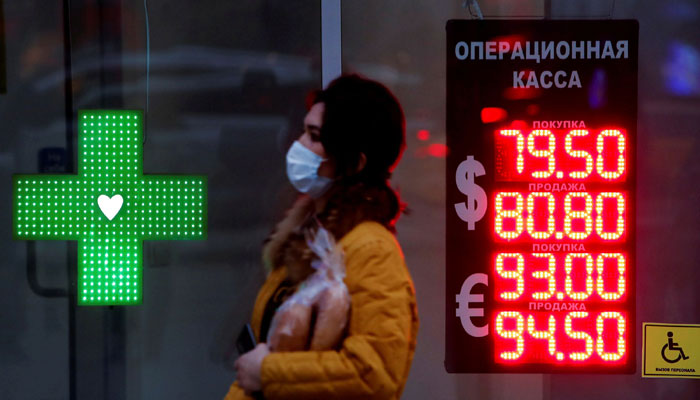Emerging market currencies lifted by vaccine hopes
London: Positive vaccine developments and Joe Biden’s win in the US election have boosted emerging market currencies and fuelled expectations among analysts for further gains in the weeks to come.
An MSCI index measuring the performance of a basket of emerging market currencies has risen 1.6 percent in the first 10 days of November, leaving it on track for its best month since late 2019 as growing confidence about the global economy prompts investors to take riskier bets.
The South African rand, Mexican peso and Russian rouble jumped more than 1 per cent against the dollar on Monday after the announcement from Pfizer and BioNTech about the results of the phase 3 trial of their Covid-19 vaccine.
After the initial surge, currencies like the rand have eased back from highs that had not been touched since March. However, analysts said the news from the drugmakers about the effectiveness of their vaccine together with Biden’s win has laid the ground for further gains.
“Pfizer results are a game changer,” wrote Deutsche Bank currency analyst Robin Winkler in a research note.
The boost from the vaccine’s success has added momentum to the recovery in emerging markets currencies, which started after the US election. The Brazilian real has strengthened nearly 7 percent against the dollar since November 2, while the Mexican peso, the South African climbed around 5 percent in that period. The Russian rouble has gained nearly 6 percent.
Investors expect that a vaccine, once approved by regulators and widely distributed, will gradually allow the world to return to normal, providing a big boost to the economy. Biden’s election victory has also received a positive reception from markets on hopes the former vice-president will take a more traditional foreign policy stance than Donald Trump.
“Combined with Biden’s victory over the weekend, we see plenty of potential for the current dollar weakening trend to continue, especially against [commodity-related] and emerging markets currencies,” Winkler said
Luis Costa, an analyst at Citigroup, said that the bank has in recent days seen higher trading flows into the South African rand, one of the most sensitive currencies to investor sentiment.
James Lord, global head of emerging market currency strategy at Morgan Stanley, added investors had been reluctant to place large bets in currencies like the Brazilian real or its peers ahead of the election, but following Biden’s win interest has picked up.
“The passing of the US election and a better macro outlook should lead to more investor appetite for allocating capital to local currency bonds, which will benefit their currencies,” Lord said.
Investors have been placing bets on a rise in the renminbi and currencies in Asia where domestic economic recoveries have gained momentum. Some of these wagers could filter into currencies like the rand, the real and the peso, while the Russian and Indonesian currencies could also benefit, Lord said.
HSBC analysts have warned, however, that after the initial exuberant reaction in markets, “a reality check of sorts” could be on the way if there are snags in the logistics around the vaccine’s distribution. Still, they said that “material progress” on the jab would benefit emerging markets.
“The Indonesian rupiah, the Mexican peso, the Russian rouble and currencies that are more dependent on international tourism flows . . . could strengthen initially”, said HSBC analysts.
The Financial Times Limited 2020
-
 Savannah Guthrie Sends Desperate Plea To Mom Nancy Kidnapper
Savannah Guthrie Sends Desperate Plea To Mom Nancy Kidnapper -
 NBA All-Star 2026 Shake-up: Inside The New USA Vs World Tournament Format
NBA All-Star 2026 Shake-up: Inside The New USA Vs World Tournament Format -
 Warner Bros Consider Reopening Deal Talks With Paramount, Says Reports
Warner Bros Consider Reopening Deal Talks With Paramount, Says Reports -
 Andrew Mountbatten Windsor Faces Future With UK MPs, Says Expert
Andrew Mountbatten Windsor Faces Future With UK MPs, Says Expert -
 Shamed Andrew Told 'nobody Is Above The Law' Amid Harrowing Silence
Shamed Andrew Told 'nobody Is Above The Law' Amid Harrowing Silence -
 Gisele Bundchen Melts Hearts With Sweet Bike Ride Glimpse Featuring Son
Gisele Bundchen Melts Hearts With Sweet Bike Ride Glimpse Featuring Son -
 Prince William Found Meghan Markle ‘quite Refreshing’ At Start
Prince William Found Meghan Markle ‘quite Refreshing’ At Start -
 Kate Middleton Knew Should Could Not Be ‘voice Of Reason’ With Prince Harry
Kate Middleton Knew Should Could Not Be ‘voice Of Reason’ With Prince Harry -
 Rihanna Has Wardrobe Malfunction At A$AP Rocky Fashion Show
Rihanna Has Wardrobe Malfunction At A$AP Rocky Fashion Show -
 Prince Harry Felt System Had ‘one Rule For Him, One For Prince William’
Prince Harry Felt System Had ‘one Rule For Him, One For Prince William’ -
 Jake Paul's Fiancée Sends Him Over The Moon Over Stunning Victory
Jake Paul's Fiancée Sends Him Over The Moon Over Stunning Victory -
 Harper Beckham Sends Valentine’s Love Amid Brooklyn Family Drama
Harper Beckham Sends Valentine’s Love Amid Brooklyn Family Drama -
 Why Prince William, Kate Middleton 'partnership' Is Important For Monarchy
Why Prince William, Kate Middleton 'partnership' Is Important For Monarchy -
 Katie Price Drama Escalates As Family Stays In Touch With Ex JJ Slater
Katie Price Drama Escalates As Family Stays In Touch With Ex JJ Slater -
 Critics Target Palace Narrative After Andrew's Controversy Refuses To Die
Critics Target Palace Narrative After Andrew's Controversy Refuses To Die -
 Sarah Ferguson’s Delusions Take A Turn For The Worse: ‘She’s Been Deserted’
Sarah Ferguson’s Delusions Take A Turn For The Worse: ‘She’s Been Deserted’




